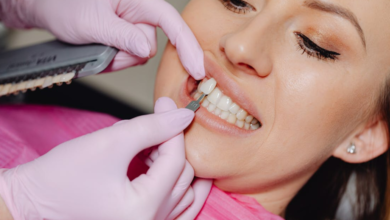Is It Serious? Key Signs of Severe Gum Disease to Watch For

Gum disease, also known as periodontal disease, is a common dental condition that affects millions of people worldwide. While early stages like gingivitis are often mild and reversible, severe gum disease can lead to serious oral health problems — and even impact your overall well-being. Recognizing the signs of severe gum disease early on is crucial to prevent tooth loss and other complications. But what exactly are the symptoms that signal you might be dealing with something serious? Let’s explore the key signs of severe gum disease to watch for.
What Is Severe Gum Disease?
Severe gum disease, medically called periodontitis, is an advanced stage of gum infection that damages the soft tissue and destroys the bone supporting your teeth. It usually develops if gingivitis, the initial inflammation of the gums, goes untreated. In periodontitis, the infection creates pockets between the gums and teeth that deepen over time, harboring bacteria and leading to tissue and bone loss.
Because the damage happens below the gum line, it can be painless and hard to notice until the disease has progressed significantly. This is why being aware of the key signs is so important.
See also: How Vosita is Revolutionizing Healthcare Access for Remote Areas
Key Signs of Severe Gum Disease
1. Persistent Bad Breath or Bad Taste in the Mouth
One of the early warning signs of gum disease, especially in its severe form, is chronic bad breath (halitosis) or a persistent unpleasant taste. This occurs because bacteria accumulate in the deep pockets formed between your teeth and gums, releasing foul-smelling toxins. If your regular oral hygiene routine doesn’t clear this up, it may be time to get checked by a dental professional.
2. Bleeding Gums That Don’t Stop
While occasional gum bleeding during brushing or flossing can happen, gums that bleed easily or continuously are a red flag. In severe gum disease, inflamed gums become fragile and prone to bleeding even without brushing hard. If you notice blood when you eat, brush, or floss regularly, it’s a clear sign of inflammation and infection.
3. Receding Gums and Longer-Looking Teeth
Severe gum disease causes the gums to pull away from the teeth, creating pockets that trap more bacteria. This gum recession makes your teeth look longer than usual, exposing more of the tooth root. Exposed roots can be sensitive to temperature changes and prone to decay, so gum recession is a serious symptom you shouldn’t ignore.
4. Loose or Shifting Teeth
As periodontitis destroys the bone that anchors your teeth, you may notice that your teeth feel loose or start to shift in your mouth. This symptom often indicates significant bone loss and is a major sign of severe gum disease. Teeth that move out of place can affect your bite and make chewing difficult, highlighting the need for immediate treatment.
5. Pain or Discomfort While Chewing
In severe cases, the infection and inflammation around your teeth can cause pain when chewing. You might feel tenderness in your gums or even throbbing pain in the teeth themselves. While mild gum disease is usually painless, any discomfort during eating should prompt a dental visit.
6. Pus or Discharge Between Teeth and Gums
The formation of pus or discharge between your gums and teeth is a sign of active infection. This usually occurs in severe periodontitis when bacteria invade the deeper layers of gum tissue. If you notice any discharge, it’s important to seek dental care quickly to control the infection.
7. Changes in Bite or Fit of Partial Dentures
If you wear dentures or partials and suddenly notice they don’t fit as well as before, severe gum disease could be the culprit. As gums recede and bone deteriorates, your mouth’s shape changes, affecting how dentures sit. This is another subtle symptom that might indicate progressing gum disease.
Why Is Severe Gum Disease a Serious Concern?
Severe gum disease is not just about losing teeth. The chronic inflammation and infection in your gums can have far-reaching effects on your overall health. Research links periodontitis to heart disease, diabetes complications, respiratory problems, and even adverse pregnancy outcomes. Moreover, once the bone supporting your teeth is lost, it can be difficult or impossible to regenerate naturally, often requiring costly dental procedures like bone grafts or implants.
What Should You Do If You Notice These Signs?
If you observe any of these symptoms, don’t delay in seeking professional dental care. Your dentist or periodontist will perform a thorough examination, including measuring the depth of gum pockets and taking X-rays to assess bone loss. Treatment for severe gum disease often involves:
- Deep cleaning (scaling and root planing): Removing plaque and tartar below the gum line to eliminate bacteria.
- Antibiotic therapy: Using topical or oral antibiotics to control infection.
- Surgical procedures: In advanced cases, surgery may be needed to reduce pocket depths or regenerate lost bone and tissue.
In some situations, if the damage is extensive, tooth extraction might be recommended to prevent further complications. For those in Harrisonburg, VA, seeking expert tooth extraction and gum disease treatment can help protect your oral health. Early treatment is key to stopping the disease’s progression and preserving your smile.
Prevention Is Key
The best way to avoid severe gum disease is through good daily oral hygiene — brushing twice a day, flossing daily, and visiting your dentist regularly for cleanings and checkups. Lifestyle factors like quitting smoking and maintaining a balanced diet also contribute to gum health.
Final Thoughts
Severe gum disease is a serious condition that can quietly progress and cause lasting damage if left untreated. Recognizing the key signs—persistent bad breath, bleeding gums, receding gums, loose teeth, pain, discharge, and changes in denture fit—can help you catch it early and get the treatment you need. Don’t wait for pain or tooth loss to take action. Prioritize your gum health and protect your smile for years to come.






